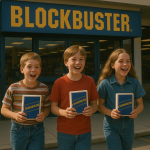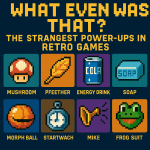There are songs—and then there are game songs. The ones that still live rent-free in your head. The ones that hit harder than your favorite mixtape. The ones that didn’t just accompany our childhoods—they defined them.
If you grew up blowing into cartridges and memorizing password screens, you already know: video game music in the ‘90s wasn’t background noise. It was the emotional core of every all-nighter, every rented weekend cartridge, every hard-fought victory.
This wasn’t just nostalgia. This was the soundtrack to growing up.
🎮 The SNES Era: When Chip Tunes Became Pure Emotion
Let’s start with the Super Nintendo—the console that taught us 16-bit could still break your heart.
Nobuo Uematsu’s Final Fantasy VI score? Literal perfection. The opening theme still gives us goosebumps. “Dancing Mad”? A four-part operatic boss theme that would’ve felt at home in a symphony hall.
Or Super Metroid. Kenji Yamamoto didn’t just write music—he built atmosphere. The game breathed through its soundtrack. Every eerie hum and pulsing rhythm made planet Zebes feel like it was watching you back.
And then there’s Zelda: A Link to the Past. Koji Kondo didn’t just give us a theme. He gave us the theme. Hear those first notes and try not to grab an imaginary Master Sword.
These weren’t just catchy—they were cinematic, emotional, alive.
🔊 Genesis Does What Ninten-Don’t: And It Sounds Like a Club
The Sega Genesis didn’t try to sound like an orchestra. It tried to sound like a rave in a cyberpunk alley—and nailed it.
Green Hill Zone from Sonic the Hedgehog? That was our anthem. Bright, bouncy, iconic. Masato Nakamura turned platforming into a musical joyride.
But the real GOAT? Streets of Rage 2. Yuzo Koshiro’s soundtrack straight-up slaps. “Go Straight,” “Dreamer”—these weren’t just tracks. They were bangers. People literally left their Genesis consoles on just to keep the music playing.
And if you ever booted up Phantasy Star, you know how deep the vibes went. Dreamy, otherworldly sci-fi synths that made you feel like you were on another planet (because you were).
💿 Enter the PlayStation: CD Audio, Maximum Feels
When the original PlayStation dropped, we leveled up. CD-quality audio meant one thing: emotion with no filter.
Cue Final Fantasy VII. “One-Winged Angel” wasn’t just a boss theme—it was an event. Latin chants, rock opera, and that moment you realized: this ain’t the SNES anymore.
Metal Gear Solid did it differently. The music moved with you. One second you were sneaking in silence, the next you were in a full-blown Hollywood chase. That wasn’t just sound design—it was a revolution.
Even Gran Turismo mattered. That licensed soundtrack made every race feel like you were living inside a slick ‘90s music video. Who knew racing games could groove?
🧠 Why These Soundtracks Still Live in Our Heads
These songs weren’t just melodies. They were emotional bookmarks.
You don’t just remember the Zelda overworld theme. You remember the freedom of having an entire afternoon to get lost in Hyrule.
You don’t just hum Green Hill Zone. You feel what it was like to be a kid in the summer with no responsibilities except collecting rings and dodging spikes.
These soundtracks are time machines. They bring back entire eras in just a few notes.
🎧 The Legacy: Still Bumping, Still Timeless
Modern games might have orchestras, Dolby surround, and Grammy-winning composers. But we’ll say it loud:
They still don’t hit the same.
There’s a reason entire symphonies now play Castlevania scores. There’s a reason YouTube is flooded with lo-fi remixes of Donkey Kong Country music. There’s a reason you still get chills when you hear the PlayStation boot-up sound.
These weren’t just tunes. They were the soul of a generation.
💬 So Let’s Hear It—What Track Still Hits You Right in the Feels?
Was it Aerith’s Theme? The Mario underground level bop? That one track from Chrono Trigger you still hum without realizing it?
Drop your favorites in the comments. Let’s build the ultimate playlist of vintage game music greatness—one emotionally devastating 16-bit anthem at a time.
Because while graphics age… music is forever.



